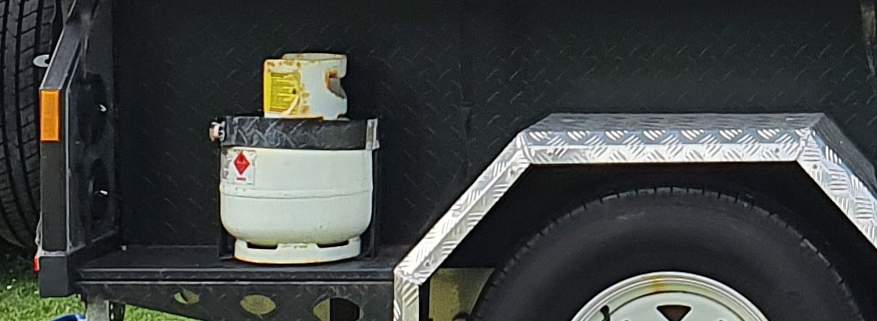Travelling Safely with LPG Cylinders

Sometimes it is easy to forget that most people who go camping or caravanning are transporting hazardous goods. LPG gas cylinders are thrown in the boot, inside caravans & trailers, inside the car or even strapped to the roof racks. While most do stand the bottle upright, there are others that will lay it down.
Many won’t think to check the gas bottles condition. Has it expired? Is it too rusty? Is it leaking? In the excitement of going on a holiday, and all the other things that have to be remembered, the gas bottle condition may be forgotten.
LP gas cylinders should be properly restrained & transported in a trailer or the tray of a ute. LPG is non-toxic, but it is flammable and potentially explosive. If the LP gas leaks inside the vehicle, it can form an explosive fuel & air mixture. This could be ignited easily by one of the car’s mechanisms, injuring or killing the passengers in the vehicle.
LPG cylinders should always be kept upright, so only the vapour at the top of the bottle is released. If the cylinder is laying on its side or upside-down LPG could be released as a liquid. You should avoid direct exposure to liquid LPG as it’s cold enough to cause freeze burns on exposed skin.
There are a couple of simple ways to test for leakage. LPG comes with a distinctive smell that comes from an odorant that is added for safety and leak detection reasons. You can also, using a spray bottle or sponge, apply soapy water to the entire hose assembly, including the tank’s valve and regulator. Turn on the LPG gas bottle without turning on appliances. If you see bubbles you have a leak. (when done, rinse with clean water to remove the soap solution).
When LPG is vented into the outside air, it quickly dissipates.
Follow these precautions for travelling with LP gas cylinders safely:
- store LPG bottles outdoors with good ventilation
- keep valves firmly closed when not in use
- do not transport cylinders exceeding nine kilograms
- cylinders are not to be transported in the enclosed boot of a vehicle
- cylinders must have a current legible test mark
- cylinders must be secured firmly in an upright position on the vehicle floor
- vehicle windows should be wound down to allow for cross-flow ventilation
- do the soapy water leak test after connecting a fresh cylinder
- do not smoke in the vehicle
- do not store LPG cylinders near an ignition source
- keep LPG cylinders away from flames or other heat sources
- remove the gas cylinder from the vehicle as soon as possible
- do not store or use flammable liquids or aerosols near LPG cylinders
- always turn off at gas bottle when finished with use
To find out more when travelling around Western Australia - Gas safety in caravans and tents - WA
14 Oct 2021

